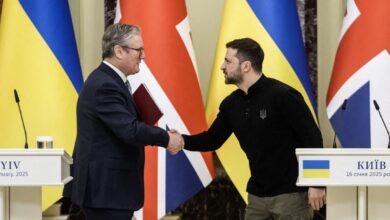Turkey says forces aiding YPG are ‘legitimate targets’ after pro-regime militias enter Efrin
Turkey said it will consider any groups aiding the YPG in the majority Kurdish Efrin canton in Syria as “legitimate targets” a day after pro-government militias entered the enclave.
“Every step taken in support for the YPG terror organisation would mean [any forces intervening on the Kurdish militants’ side] are on the same level as terror organisations. And for us, that would make them legitimate targets,” Turkey’s presidential spokesman Ibrahim Kalin said on Wednesday, February 21.
https://twitter.com/agire_cudi/status/965969053780201473
Pro-government forces which apparently included Syrian National Defense Forces militias from nearby Nubl and Zahraa as well as Iran-backed militias entered Efrin in a convoy of around 50 vehicles on Tuesday evening. The convoy was met by YPG leaders and the group was ceremonially welcomed.
The YPG and other SDF constituent groups have been on good terms with pro-regime forces in the twin towns of Nubl and Zahraa for several years, notably coming to their aid when attacked by Turkey-backed rebels in 2016. SDF component and long-time YPG ally Jaysh al-Thuwar reportedly bought anti-tank guided missiles from militias in the twin towns late last year. Efrin officials have long called for Syrian government help in their defence against Turkey.
Turkey said it fired “warning shots” at the convoy, which Turkey’s President Recep Tayyip Erdoğan on Tuesday said forced it to turn back. There were reports that two pro-government fighters were killed and five injured in the shelling, but The Defense Post has not confirmed this.
However, images and video published by Kurdish activists later Tuesday appear to show NDF members in the Efrin region, and further images posted on Wednesday purport to show NDF militia members in the Jandaris area in southern Efrin, one of the frontlines with Turkish forces.
https://twitter.com/AfarinMamosta_/status/966019228406046721
According to both pro-government and Kurdish activists, at least some of the pro-regime militias reportedly based themselves at Kafr Jana, near Turkey/Free Syrian Army-held Azaz, which was home to a detachment of Russian troops prior to the January 20 launch of Turkey’s Operation Olive Branch incursion in Syria.
“Today, tomorrow could they attempt this again? It’s possible. But the relevant measures have been taken,” Kalin said. “It doesn’t matter who makes such an attempt, there will be serious consequences.”
Erdogan implied that earlier discussions with Russian President Vladimir Putin and Iranian President Hassan Rouhani had resolved the days-old question of pro-government forces entering the enclave. “[On Monday] we agreed on these issues in talks with Putin and Rouhani. Unfortunately, you know, these kinds of terrorist organizations have [sometimes] taken the wrong steps with the decisions [they have made] on their own,” he said, apparently implying the groups had entered Efrin without permission.
Asked if Turkey would speak directly to Syrian President Bashar al-Assad’s government, Kalin said: “When extraordinary conditions necessitate it, our intelligence agency can get in direct or indirect contact [with Syrian intelligence] to solve certain problems in the field. This is part of the mission given to our intelligence organization.”
“High-level political dialogue between Ankara and Damascus as suggested [by Russian Foreign Minister Sergey Lavrov] is out of the question,” he added, underscoring that messages from Ankara have long been conveyed to Damascus by Russia and Iran.
“The Republic of Turkey does what is needed for its national interests and we owe no explanation [for the Efrin operation],” Kalin added.
In the 31 days since the launch of Operation Olive Branch, Turkey has captured around 10 percent of the land controlled by the self-declared administration in Syria, mainly along its border.
Turkey says the operation aims to “neutralize the terrorists belonging to PKK/KCK/PYD-YPG” as well as Islamic State in northwestern Syria. There is no known ISIS presence in the area.
Turkey views the predominantly Kurdish People’s Protection Units (YPG) and its linked Democratic Union Party (PYD) political party which together control Efrin as extensions of Turkey’s Kurdistan Workers’ Party (PKK), which has fought a decades-long insurgency mainly in Turkey’s majority-Kurdish southwest.
The YPG makes up the backbone of the U.S.-led Coalition backed Syrian Democratic Forces, the main U.S. ally fighting ISIS in Syria.
With reporting from AFP












